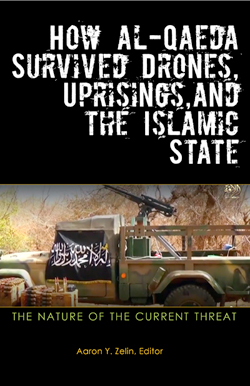
Over the past eight years, al-Qaeda’s fortunes have ebbed and flowed. Drones, uprisings, and a challenge from the Islamic State have forced the core al-Qaeda organization—historically based in the Afghanistan/Pakistan region—and its various branches to adapt and migrate outward.
In this new Policy Focus, Washington Institute fellow Aaron Y. Zelin compiles case studies demonstrating how each part of al-Qaeda’s network has evolved and survived the various challenges it has faced roughly since the Obama administration took office. Written by eminent scholars, practitioners, and government officials from the United States and abroad, the chapters are informed by a recent workshop in which the participants gave candid, off-the-record assessments of numerous key issues, including al-Qaeda’s current strategic outlook, a close examination of its branch in Syria, its branches outside of Syria (AQAP, AQIM, al-Shabab, and AQIS), and its current financial situation.
Contributors include: myself, Bruce Hoffman, Charles Lister, Daveed Gartenstein-Ross, Samuel Heller, Katherine Zimmerman, Andrew Lebovich, Christopher Anzalone, Don Rassler, Hans-Jakob Schindler, Katherine Bauer, and Matthew Levitt.
Click here to read the full publication (124 pages).
Category: Malaysia
New magazine: "Fātiḥīn, Issue #1"

Click the following link for a safe PDF copy: Fātiḥīn Magazine #1
________________
To inquire about a translation for this magazine issue for a fee email: [email protected]
Check out my new article for The National Interest: "What Do Asian-Oceanic Nations Think about ISIS?"

Recently, I had the opportunity to travel to a number of key Asian-Oceanic nations and allies of the United States to discuss issues related to Iraq, Syria, the Islamic State (IS) and foreign fighters. While much of the focus in Washington has been on the role of Western European and Arab partners in the fight, Asian-Oceanic countries also have their own interests related to this issue. In particular, I spoke with governmental officials, academic scholars and others in Singapore, Japan, China, New Zealand and Australia. While each country looks at the problem-set through a different lens and/or interests, as well as has varying degrees of threat-levels, it is clear that all are concerned and want to take an active role in combatting it.
Click here to read the rest.
